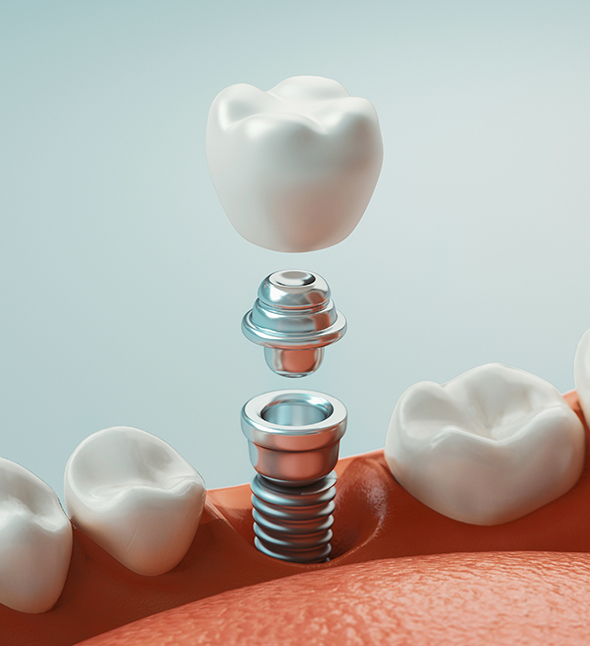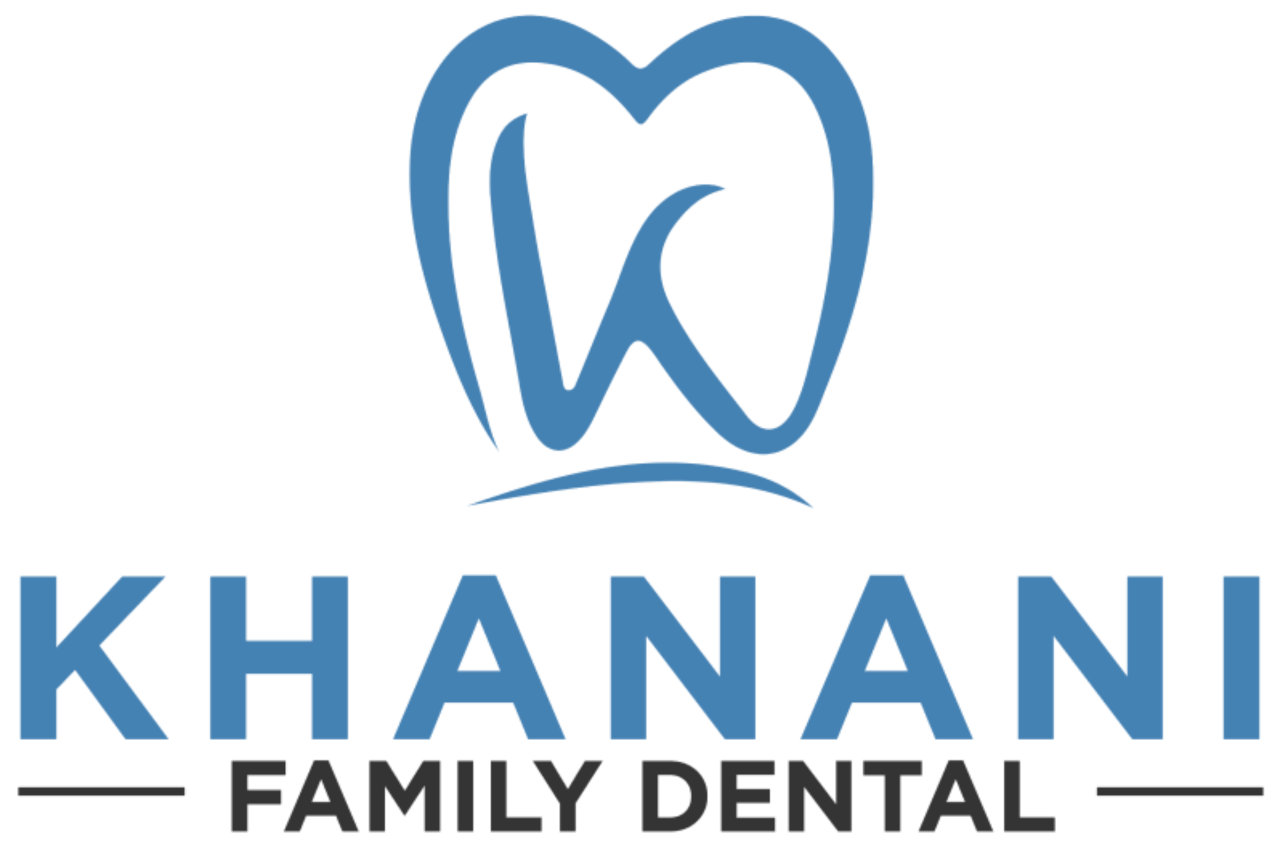We are Not A MassHealth Provider
Dental Implants

Benefits of Implants at Khanani Family Dental
Dental implants last 30+ years with proper care, making them the best long-term option to restore missing teeth
Implants protect and preserve your jaw bone and help prevent bone loss, which is a common issue after losing a tooth
We use the latest implant planning & surgical techniques to place implants precisely and eliminate complications
Dr. Khanani will sit down with you to discuss the entire dental implant process to ensure you understand the timeline of your treatment
Dental Implants
Frequently Asked Questions
After you’ve been approved for dental implants, our Holden, MA dentist will take x-rays and images of your face and mouth to design your personalized implant placement plan. At your next appointment, your implant will be placed.
Dr. Khanani will begin by cleaning and numbing the treatment area, and sedation will also be administered. Then, he will create a small opening in your jaw and gums to place your implant precisely. The area will be cleaned and disinfected, then sutured shut.
Your mouth will need to heal for about 3-6 months. During this time, your implant will “osseointegrate” and permanently bond with the jaw bone. As you heal, you will come in for several follow-up appointments. Dr. Khanani will check your healing progression and take dental impressions to begin creating your dental crown with the help of a dental lab.
When your mouth has healed completely and your dental crown has been created, you’ll come back for your final appointment. Your crown will be permanently attached to the implant and you’ll leave with a fully-restored, natural-looking tooth.
Implant surgery isn’t painful, because we administer a local anesthetic before we make any incisions. Your mouth will be completely numb and you may be given pain medication before the surgery to ensure that you don’t feel any residual pain after the procedure.
It will take a few hours for the anesthetic to wear off. Once it does, you may feel some minor discomfort or tenderness, which can be relieved with anti-inflammatory pain medication. If your dentist prescribes you pain medication, you can take this as instructed. You should also use a cold compress in the first 48 hours for 15 minutes on and off to reduce swelling.
After your surgery, Dr. Khanani will give you a set of recovery instructions, which you should follow to ensure that your mouth heals properly. For most patients, it takes about 2 weeks for you to heal from the initial implant placement surgery.
However, it may take up to 3-6 months for your dental implant to permanently bond with the surrounding bone tissue. This process is known as “osseointegration,” and your implant cannot be restored with a false tooth until it’s complete.
Immediately after your appointment, you likely won’t feel any pain or discomfort. However, after your sedation and numbing wear off, your implant site may begin to feel tender or painful. If Dr. Khanani has given you a prescription for pain medication, ensure that you fill it and take it as directed.
If not, you can take an over-the-counter medicine like Aleve or Tylenol to help with the pain. You may also find that applying an ice pack to the outside of your mouth for 10 minutes at a time will help with pain and swelling.
For the first week after your implants are placed, you’ll want to eat a diet of mostly soft foods, and avoid brushing the implant site directly for at least 24-48 hours. You can use a salt water rinse to clean the area. After 2-3 days, you can gently brush near the implant site.
You also will need to avoid heavy exertion for at least 2-3 days after your implant is placed. Take things easy, and try to rest and relax as you heal.
Your pain, swelling, bleeding, and bruising will usually peak about 72 hours after your appointment. After about a week, your mouth will likely feel much more normal, and you should not be experiencing any bleeding, and quite a bit less discomfort.
By the end of two weeks, your mouth should feel completely normal, and you should not be experiencing any pain, though the implant area may still be slightly tender. Around this time, you’ll typically come in for a follow-up appointment at Khanani Family Dental, so that our team can ensure your mouth is healing properly.
Most patients keep their dental implants for the rest of their lives. With proper brushing and implant care, your implants will easily last 30 years or longer. They are the longest-lasting method of smile restoration by far, so choosing dental implants is a great investment in your long-term oral health.
It’s important, however, to note that your implant restoration may not last this long. Dental implant restorations like crowns, dental bridges, and implant-supported dentures will wear out before your implant itself does.
This is because unlike your implant, your dental implant restoration is exposed to the wear & tear of biting and chewing.
Usually, your implant supported restoration will have to be replaced about every 10-15 years, though this may vary depending on the patient, and on the type of restoration that has been placed on your implant.
Not necessarily. Plenty of people are candidates for dental implants without the need for a bone grafting procedure. A bone graft is only needed if you lack sufficient jaw bone density and structure to support a dental implant.
This may be necessary if you’ve suffered from bone loss due to a lost tooth, dental trauma, gum disease, or medical conditions. Bone grafts are necessary when you lack adequate bone tissue because this can result in implant failure.
During the osseointegration phase, where the jawbone and implant fuse, this results in a secure foundation for your implant that will prevent bone loss. However, if you don't have enough jaw bone mass, this crucial healing process won't be able to take place.
If it turns out you don’t have sufficient jaw bone density, we can just place a bone graft around the area of the implant to increase the height and width of the jawbone. Bone grafts are very useful, as they make it possible to replace missing teeth with dental implants for patients who would otherwise be ineligible without them.
The most important thing when it comes to your diet is to stick to soft foods until you recover and to avoid hot foods and liquids. Especially in the first week, you do not want to be consuming hot liquids like coffee, tea, or soup.
You will want to drink plenty of liquids and stick to things like blended-up smoothies, applesauce, mashed potatoes, jello, and pudding. After the first week, you can begin to introduce chewier foods but you should still abstain from hard, crunchy, and sticky foods for a few months or until your dentist says it’s okay.
Other foods that you can eat include potatoes, pasta, and eggs. Since it may be more difficult to eat, make sure you’re getting enough nutrients. Prioritize getting enough protein, drinking plenty of water, and eating enough.
You should avoid spicy and acidic foods while you are healing. During this time, do not drink through a straw and chew on the side of your mouth that does not have the implant.
Schedule Your Consultation Today!
Do you have a missing tooth and are concerned about bone loss? Dental implants could be right for you! Contact us at Khanani Family Dental today to schedule a consultation with Dr. Salman Khanani.
